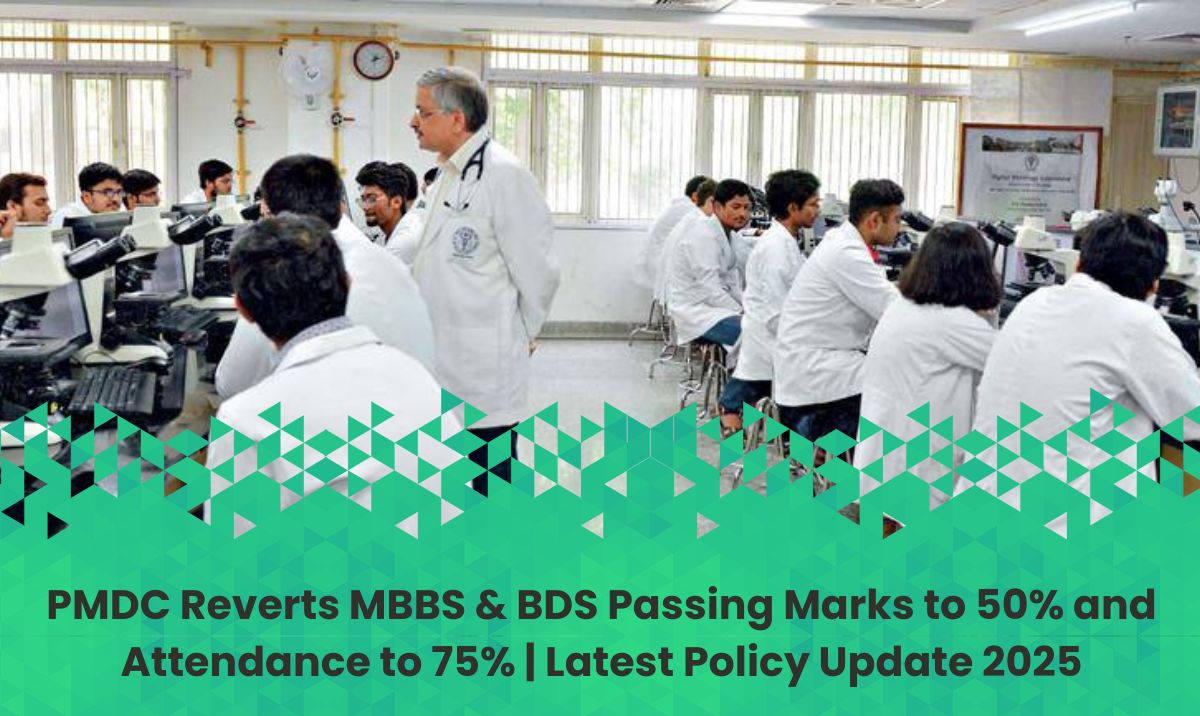
In a major relief for medical and dental students across Pakistan, the Pakistan Medical and Dental Council (PMDC) has officially reversed its previous decision regarding the passing marks and attendance requirements for MBBS and BDS programs. The council has restored the 50 percent passing marks and 75 percent attendance criteria for the ongoing 2024–25 academic session.
PMDC Withdraws 65% Passing Marks Decision
The PMDC had earlier announced that the passing marks for MBBS and BDS students would be increased from 50 percent to 65 percent, effective from the 2024–25 academic year. However, this move faced strong criticism from students, parents, and educational institutions, who argued that the new criteria were too stringent and would unfairly impact academic progress.
After reviewing feedback from various stakeholders, the council has officially withdrawn the decision. According to the new notification, all medical and dental colleges are now directed to follow the previous benchmark of 50 percent passing marks for all professional examinations.
This step has been taken to maintain uniformity across medical institutions and to ensure that students are not subjected to abrupt academic changes in the middle of their ongoing sessions. The council stated that the revised decision will take effect immediately, and no student will be evaluated based on the earlier 65 percent policy.
Attendance Requirement Restored to 75 Percent
Alongside the passing marks adjustment, the PMDC has also rolled back its previous decision on attendance. Earlier this year, the council made it mandatory for MBBS and BDS students to maintain 85 percent attendance in all academic and clinical sessions to be eligible for examinations.
However, the council has now restored the attendance threshold to 75 percent, the same rule that was followed before the revision. This change provides relief to students who had expressed difficulties in meeting the 85 percent requirement due to clinical rotations, transport issues, or unavoidable absences.
The council emphasized that while attendance remains an important aspect of medical education, institutions must ensure flexibility and fairness in implementing these regulations.
Reasons Behind the Policy Reversal
The PMDC’s reversal of these decisions comes after widespread consultations with medical universities, teaching hospitals, and student representatives. Several institutions reported that enforcing the 65 percent passing criteria would not only lower the passing rate but also place unnecessary academic stress on students who were already adjusting to revised syllabi and exam formats.
Students and parents had also voiced their concerns that the sudden policy shift could affect progression rates and delay professional qualification timelines. The PMDC acknowledged these concerns and stated that the aim of medical education reform should be gradual improvement, not abrupt change.
By restoring the earlier standards, the council aims to ensure stability and fairness in the assessment process while maintaining academic discipline and quality.

Impact on Students and Institutions
This decision is expected to benefit thousands of MBBS and BDS students currently enrolled in medical and dental colleges across Pakistan. With the return of the 50 percent passing marks rule, many students who were worried about the higher threshold can now prepare for examinations with more confidence.
For institutions, this policy shift will require immediate administrative updates. Examination departments, course coordinators, and academic councils must revise their internal policies, grading rubrics, and attendance monitoring systems to align with the updated PMDC guidelines. Colleges are also required to inform students officially about the change to avoid confusion during upcoming assessments.
Additionally, medical universities that had already started preparing for the 65 percent standard will now need to revert to the older system to ensure uniform compliance nationwide.
PMDC’s Commitment to Educational Standards
Despite restoring the previous criteria, the PMDC reaffirmed its commitment to maintaining high educational and professional standards in medical and dental education. The council highlighted that quality assurance remains a top priority and that any future reforms will be introduced gradually, with full consultation from all stakeholders.
The PMDC also indicated that it will continue monitoring institutional performance, curriculum implementation, and examination integrity to ensure consistency and excellence in medical education.
Future Policy Outlook
While the decision has been largely welcomed, the PMDC is expected to revisit the matter in upcoming council meetings. Officials hinted that the passing marks and attendance requirements could be reviewed again for future academic sessions, possibly introducing incremental changes instead of abrupt reforms.
Students are encouraged to focus on academic excellence and clinical competence rather than relying solely on reduced thresholds. The council emphasized that while the 50 percent passing mark provides relief, students must still demonstrate professional competence and ethical responsibility to meet the high expectations of the medical field.
The PMDC’s latest decision marks an important shift in Pakistan’s medical education landscape. By restoring the 50 percent passing marks and 75 percent attendance policies, the council has prioritized student welfare while maintaining the integrity of the education system.
This balanced approach ensures that medical and dental students are evaluated fairly and given adequate time to adapt to new standards. It also reflects the PMDC’s commitment to promoting quality education through gradual, consultative reforms rather than abrupt policy changes.
As the new regulations take immediate effect, both students and institutions must align their academic procedures accordingly. The move is expected to bring relief, stability, and renewed focus on learning outcomes within the country’s medical and dental education framework.















